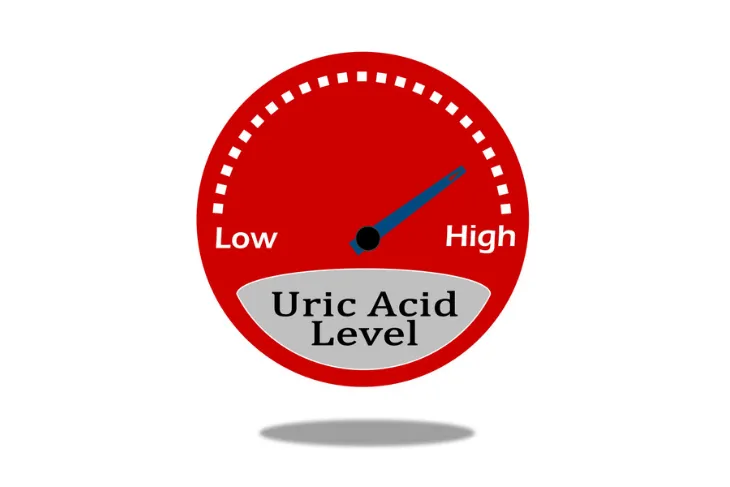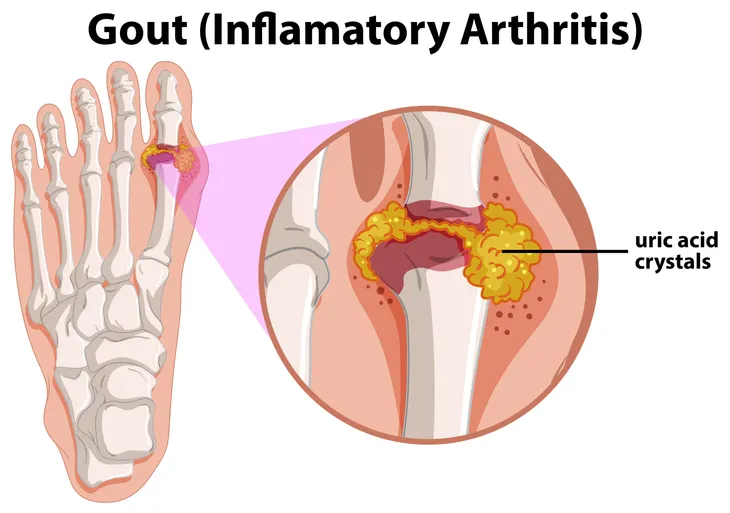So, your doctor has told you that you have hyperuricemia. It might sound scary, but it refers to high uric acid levels in your blood, which can lead to a number of health issues (such as gout) or be a sign of existing issues.
Luckily, there are adjustments you can make to your diet to help prevent complications. There are also treatments available if the problem has developed into something more serious. Read on to learn more about high uric acid, and what to do about it…
What Is Uric Acid?
Uric acid is produced when purines are broken down. Purines are formed and broken down in the body and are also found in certain foods, such as some types of meat, dried beans, and alcohol.
In a normal scenario, the uric acid is then carried through the bloodstream into the kidneys where the majority is filtered out.
What Is High Uric Acid?
Medical News Today explains it’s normal to have some uric acid in the blood. A normal range for males is 2.5-7.0-mg/dL, and a normal range for females is 1.5-6.0-mg/dL.
But sometimes the body produces too much uric acid or can’t get rid of it properly. When this happens, uric acid can build up in your blood. High levels of uric acid for males are above 7.0-mg/dL, whereas high levels for females are above 6.0-mg/dL.
What Causes It?
Medical News Today explains there can be several possible causes of hyperuricemia. For example, there are “genetic and environmental factors” (including diet) that can be risk factors.
The source names metabolic syndromes (that could cause resistance to the glucose-regulating hormone) as being a possible cause. Other risk factors include high blood pressure, use of diuretic medications, and being male.
Other Related Medical Causes
The same source explains there are some other medical conditions and treatments that might be causing high uric acid. More specifically, cancer treatment might be a culprit. The source explains that chemotherapy can cause cells to die, and when they do, they release purines.
Kidney disease could also be causing high levels of uric acid. This condition damages the kidneys and stops them from functioning properly, which leads to a buildup of uric acid in the blood.
Stress Might Be a Factor
Prolonged stress could have several negative effects on physical health. Healthline explains that stress, as well as not enough rest and exercise, can cause inflammation that could “set off a high uric acid level.”
The source suggests trying yoga or breathing exercises to help achieve a natural calm. Stretching several times a day is also beneficial. If you’re having trouble falling asleep or staying asleep, consult a physician.
What Are the Symptoms of High Uric Acid?
As noted earlier, you may have higher than normal uric acid levels without knowing it, but some signs might give you a hint, especially if you’ve had high uric acid levels for an extended period of time.
For example, you might develop gout, which can cause painful, swollen joints (caused by a buildup of urate crystals), according to Medical News Today. Meanwhile, high levels of uric acid can also result in kidney stones, which can have signs including back pain, frequent urination, and blood in the urine
How Is It Diagnosed?
The Cleveland Clinic explains that high uric acid can be determined by a simple blood test. However, you may have come to the doctor for another problem, such as a painful kidney stone. In this case, the stone may be tested to see if uric acid was a factor in its development.
Meanwhile, gout is a complication of high uric acid that is diagnosed in another way. The source explains gout is confirmed if uric acid crystals can be seen in the fluid drawn from a joint. Gout can also be detected through medical imaging such as an X-ray or ultrasound.
How Can High Uric Acid Be Prevented?
The Cleveland Clinic says that high uric acid can be managed with medications that help dissolve any deposits of uric acid crystals causing painful complications. However, the source notes, “A lifelong urate-lowering therapy may be needed, with medications that prevent gout flares and ultimately dissolve crystals that are already in your body.”
The source also explains that it might be recommended to lose weight to help control high uric acid. Low-impact exercises, such as walking and biking can also help protect the joints. You can also make changes to your diet, which we’ll explain in more detail next.
Foods to Avoid
Medical News Today says that many foods contain purines, but you can follow a “low purine diet” that could be beneficial. The source notes “moderate or high levels” of purines are found in bacon, organ meats, turkey, and certain seafood (such as shellfish, trout, haddock, sardines, and herring).
The source also says a low-purine diet includes avoiding fatty foods such as fried food and full-fat dairy. Alcoholic beverages (beer and whiskey in particular), as well as sweetened drinks like soda and fruit juice, should also be removed from the lineup.
Foods to Eat
The same source has some recommendations for foods to eat on a low-purine diet. They include drinking plenty of water to help flush out uric acid. Beyond that, you can eat low-fat dairy (such as milk and yogurt), as well as grains and starch (including bread, pasta, and potatoes).
The source says you should also increase your intake of fruits and vegetables and look for good sources of vitamin C, such as oranges, strawberries, and bell peppers. Coffee, tea, and “carbonated beverages” (likely not the aforementioned soda) are also on the “good” list.
Check Your Medications and Supplements
Healthline explains that some of the medications you’re taking for other conditions might actually be causing a buildup of uric acid. More specifically, it names diuretics, immunosuppressants, and chemotherapy drugs as the main culprits. Aspirin can also raise levels.
Meanwhile, some of the vitamin supplements you’re taking could also be a factor. Supplements of vitamin B-3 (also known as niacin) in particular can be the issue.
When to See a Doctor
Mayo Clinic explains, “Having a high uric acid level is not a disease or a condition that necessarily needs to be treated or searched for in the absence of other symptoms.” However, if you experience symptoms of a gout attack, or have a kidney stone, your doctor may check for high uric acid levels.
Furthermore, if you use any of the medications or supplements mentioned above and have high uric acid levels, you should talk with your doctor about alternatives.















